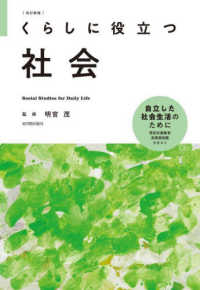Full Description
How does religious faith contribute to happiness? The usual answer is that religious belief relieves the anxieties of ordinary life and that religious belonging provides emotional support. But a growing body of literature suggests that happiness is more complicated than that. Happiness is not only a feeling. It is a practice that we engage in actively, that we attempt to manage, and that is in many ways managed for us -- by social norms and institutions.
In Nurturing Happiness, Robert Wuthnow develops the concept of emotional practice and locates it in the sociological literature on practice theory. He describes how American faith leaders at pivotal moments in their history attempted to nurture -- and control -- their adherents' thoughts about happiness and their experiences of it. He shows how religious authorities used their discursive power to draw moral distinctions among kinds of happiness and their institutional power to manage where it took place and how it was expressed. And he demonstrates that religious authorities' efforts to nurture happiness, while not always effective, played a crucial role in faith communities' adaptation to changing social conditions.
This book describes these adaptations in colonial-era arguments about heavenly joy and virtuous living, nineteenth-century revival meetings and festive events, Progressive-era advocacy for useful service, recent efforts to link play with transcendence and to associate joyful spirituality with personal discipline, and current responses to the fallout from illicit pursuits of happiness. Nurturing Happiness is required reading for anyone interested in understanding how religious faith relates to happiness.
Contents
Introduction: Perspectives on Happiness
1: Earthly and Heavenly Happiness: Dialogic Comparisons in Colonial America
2: Getting Happy: Revival Era Exuberance and Conviviality
3: Festive Emotion: Fairs, Gender, and Identity in the Age of Industrialization
4: Durable Happiness: Progressive Era Constructions of Work and Service
5: Transcendent Play: Searching for Wholeness in the 1960s and Beyond
6: Spiritual Discipline: The Hard Work of Finding Joy
7: Illicit Happiness: The Fallout from Betrayals of Trust
8: Conclusion: Nurturing Happiness








